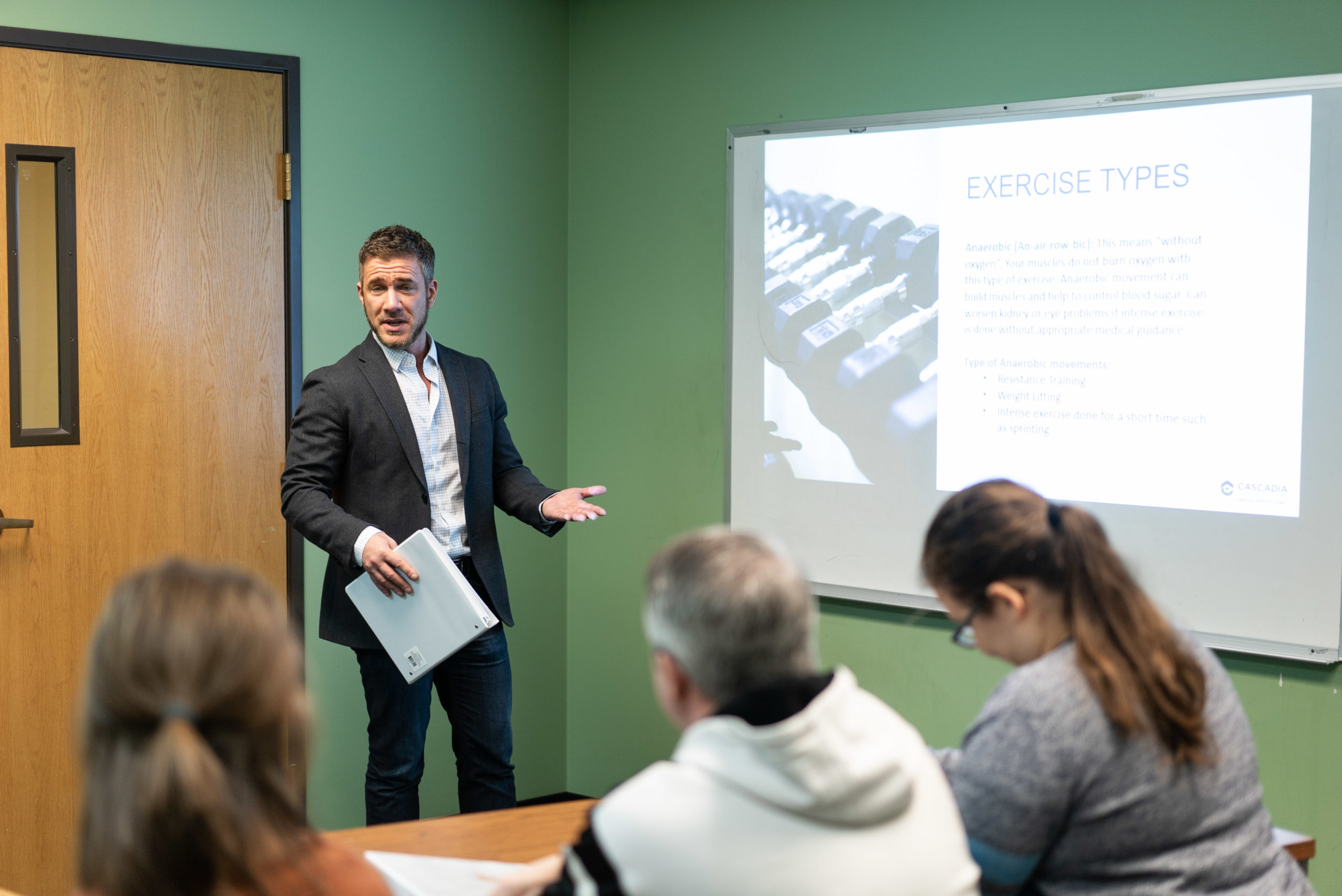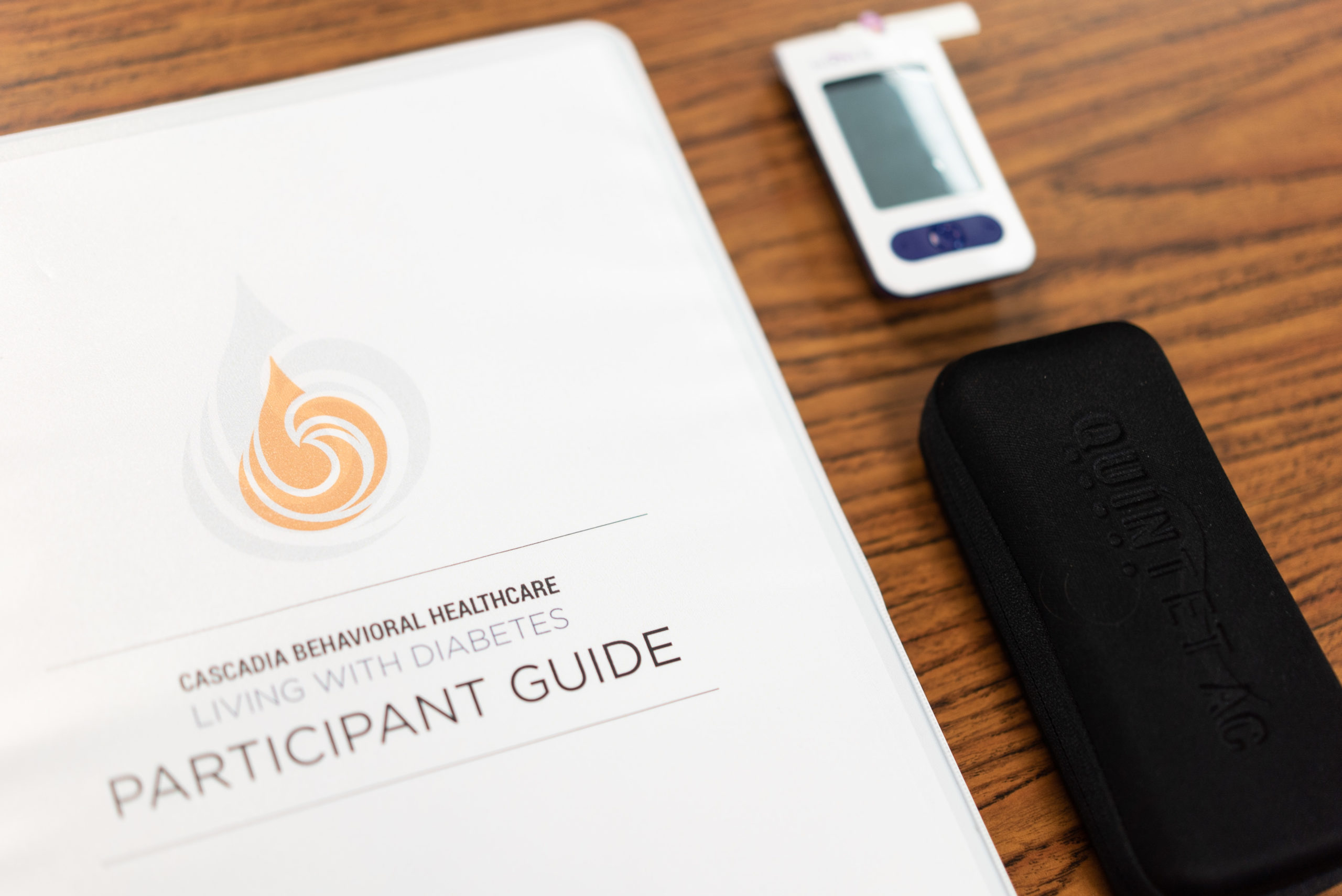February 4, 2020
Cascadia Rolls Out Program to Support Management of Diabetes and Mental Health
A significant percentage of the American population lives with diabetes, and those numbers are two to three times higher for individuals with a mental health issue. Diabetes symptoms can be more severe for these individuals, as they face the challenges of managing their physical and behavioral health. Additionally, diabetes and mental health are mutually reinforcing; diabetes can increase mental health challenges, and psychiatric medications used to treat mental health can worsen or even cause diabetes.
There are multiple chronic disease self-management programs, including programs that focus on diabetes, however none of them address mental health. Cascadia feels strongly that physical and mental health cannot, and should not, be treated separately. The Population Health team members at Cascadia felt it was critical to identify a self-management program based on whole health and the reciprocal nature of diabetes and mental health.
“There’s no way to disentangle someone’s physical health and mental health, especially when it involves the self-management of something like diabetes,” said Allison Brenner, Population Health Research Director at Cascadia. “We decided to look into innovative self-management programs, specifically created for and evaluated among individuals with these coexisting health challenges.”
To address disparities in our population, Cascadia’s Population Health team set out with a goal of supporting integrated healthcare for clients with diabetes. Through careful research and planning, as well as funding and collaboration from HealthShare, Cambia Health Foudnation, and CareOregon, Cascadia developed an intervention program that focused on improving whole health and diabetes self-management for clients who have diabetes or pre-diabetes and a co-occurring mental illness.
“To do this, and to do so successfully, we needed to tackle it holistically,” said Brenner. “It was important for us to look at diabetes alongside other crucial health factors, like behavioral health and overall physical health – even oral health.”
The 12-week program, Living with Diabetes, was delivered in two waves and began last summer. By the conclusion of the pilot in February, the program will have been delivered at all four of Cascadia’s health centers as well as two supportive housing sites, Prescott Terrace and Rain Garden. Living with Diabetes is a group skills training and support program using an innovative curriculum that had not yet been utilized outside of a research setting. The integrated curriculum includes skill building to help manage both diabetes and mental health, and also addresses mental health stigma, stress action planning, and effective communication with healthcare providers.
Enhancing integrated care for clients with diabetes and a mental health challenge was a key focus of the work. Living with Diabetes includes a dedicated Care Coordinator who assists clients by connecting them to healthcare and other resources, and tracking test results and healthcare utilization related to diabetes. The program coordinates with clients’ behavioral health providers to ensure they have the support and resources they need to stay healthy, both mentally and physically.
Living with Diabetes uses two facilitators to deliver the program. The unique inclusion of Peer Wellness in the facilitation of the weekly curriculum, with occasional guest appearances from nursing and medical staff, ensured that clients were fully supported in their journey. The facilitators were responsible for delivering the program activities in a specific and consistent format, communicating regularly about the participants to the program’s diabetes Care Coordinator and research team, and supporting clients and the team in planning and evaluation.
The initial results of the program suggest significant improvements in self-reported physical and mental health and diabetes self-management. Clients involved in the program reported increased vitality/energy and more confidence in managing mental health. Clients also experienced improvements in factors essential to the self-management of diabetes, like exercise and overall diet/consumption of fresh fruit and vegetables.
Equally as important, Living with Diabetes clients reported being very satisfied with the curriculum, ease of understanding the information presented, as well as feeling welcomed and comfortable sharing insights. One client shared that the program helped promote open communication about their health needs: “I learned how to speak up for myself and talk about what my needs are.” Another client noted that they gained a new perspective on their health: “My mood and mental health is intricately related to physical health, so if I’m not feeling like I’m very happy, I check and see how I am doing physically and see if there is something that is causing me to feel that way.”
The Population Health team’s hope is that this program and its success can serve as a launch pad for wider implementation across all of Cascadia, so these offerings can help even more people achieve whole health. Additionally, as Cascadia continues to implement its integrated healthcare model, this program supports the value of an integrated approach to healthcare and can serve as a model for ongoing programs and interventions.
To learn more about Cascadia’s population health work and integrated care model, visit: https://cascadiahealth.org/integrated-healthcare/.


